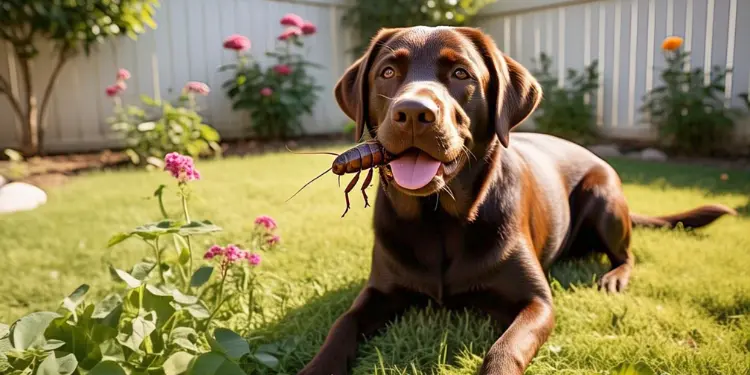Have you ever caught your dog trying to snack on a cockroach? You’re not alone. Many dog owners wonder, can dogs eat cockroaches without getting sick? While dogs often act on their natural hunting instincts, eating bugs—especially cockroaches—can expose them to dangerous health risks. This article explains why dogs eat cockroaches, what risks are involved, and what to do if your pup chomps down on one.

Can Dogs Eat Cockroaches?
Dogs can eat cockroaches—but they definitely shouldn’t. While one roach might not seem harmful, these insects can carry bacteria, parasites, and even toxic pesticide residue.
Cockroaches offer very little nutritional value. They contain trace amounts of lysine, vitamin B12, and protein but not enough to benefit your dog’s diet. Instead, the potential health risks far outweigh any small dietary gain.
Why Cockroach-Eating Is a Concern
Allergies and reactions: Dogs may react to proteins in cockroach shells.
Disease exposure: Roaches crawl through sewers, garbage, and moldy areas.
Parasite transmission: They can carry stomach worms like Physaloptera.
Pesticide residue: They may have come in contact with harmful bug sprays.
Why Do Dogs Eat Cockroaches?
Dogs eat cockroaches mostly out of curiosity and instinct. Dogs evolved from scavengers and still have a strong prey drive. Fast-moving bugs like roaches trigger this instinct.
Cockroaches can also emit smells that intrigue a dog’s powerful nose. Some dogs are just bored and eat insects as a form of play. Ensuring your dog gets enough mental stimulation and interactive toys can help reduce this behavior.
Additional Reasons:
- Hunger or nutrient deficiencies: Rarely, a dog lacking certain minerals might resort to odd behaviors like eating bugs or dirt.
- Environmental boredom: Dogs left alone without stimulation may hunt bugs just for entertainment.
- Reinforced behavior: If a dog eats a cockroach and experiences no negative consequence, they may continue the habit.
Risks of Dogs Eating Cockroaches
1. Disease and Bacteria
Cockroaches often carry Salmonella, E. coli, and other pathogens. When dogs consume roaches, these germs can lead to stomach upset, vomiting, or even foodborne illness. Dogs with compromised immune systems or puppies are at greater risk.
2. Parasites
The stomach worm Physaloptera can live inside cockroaches. If your dog eats an infected bug, the worm can enter their gastrointestinal system, causing:
- Vomiting
- Diarrhea
- Weight loss
- Abdominal pain
These symptoms may appear days after ingestion, making diagnosis more difficult.
Did you know? According to DoDogsEat.com, parasites passed through insects are more common in outdoor dogs or those in cockroach-prone environments.
3. Pesticide Poisoning
Many homes use sprays or baits to control cockroaches. If a dog eats a cockroach that has been exposed to these chemicals, they risk poisoning.
Signs of pesticide poisoning include:
- Drooling
- Muscle tremors
- Vomiting
- Lethargy
- Seizures (in severe cases)
Some products, like boric acid, pyrethroids, or fipronil, are particularly toxic to dogs—even in small amounts.
4. Choking Hazard and Digestive Blockage
Cockroaches have hard exoskeletons that don’t break down easily in a dog’s stomach. If swallowed whole, they can cause blockages—especially in small breeds.
Watch for:
- Gagging or choking
- Constipation or lack of bowel movement
- Lethargy
- Loss of appetite
In rare cases, sharp body parts (legs, antennae) can irritate or injure the digestive tract.
5. Allergic Reactions
Some dogs are sensitive to cockroach allergens. Symptoms may include:
- Skin rashes
- Swelling around the mouth or eyes
- Sneezing or watery eyes
- Hives or itchy skin
Severe reactions could involve difficulty breathing. Prompt medical care is vital.
What to Do if Your Dog Eats a Cockroach
1. Stay Calm and Observe
One clean cockroach may not cause harm in a healthy dog. However, watch your dog for 24–48 hours. Look out for:
- Vomiting
- Diarrhea
- Lethargy
- Behavioral changes
2. Contact Your Veterinarian
If you notice any symptoms—or know the roach may have come into contact with chemicals—contact your vet immediately. Quick action may prevent serious health issues.
Use our Contact Us page to get professional guidance tailored to your dog’s needs.
3. Bring a Sample if Possible
If you have access to the dead cockroach, bring it to your vet. This can help identify the type of insect or pesticide exposure.
Preventing Your Dog from Eating Cockroaches
1. Keep Your Home Clean
Cockroaches thrive in messy environments. Clean floors and store food in sealed containers to reduce pests.
2. Use Pet-Safe Pest Control
Avoid chemical sprays that could harm your pet. Opt for pet-safe traps or natural repellents like diatomaceous earth.
Extra Tip: When using insecticides, ventilate the space thoroughly and keep pets away for at least 24 hours.
3. Keep Dogs Mentally Stimulated
Bored dogs are more likely to hunt bugs. Use puzzle toys, training games, and frequent walks to keep your dog mentally and physically engaged.
4. Seal Entry Points
Prevent roaches from entering by sealing cracks in walls, fixing leaks, and keeping garbage bins tightly closed.
5. Feed a Complete Diet
Ensure your dog gets all essential nutrients. Dogs with deficiencies may display pica, a condition where they eat non-food items—including bugs.
Natural Alternatives to Bug Control
Consider these pet-safe methods:
- Boric acid in pet-inaccessible locations
- Essential oil sprays (e.g., peppermint, eucalyptus—used with caution)
- Baking soda and sugar traps
- Professional pest services with pet-friendly practices
Always discuss new pest control treatments with your vet before use.
When to See the Vet
Call your vet or visit a clinic if:
- Your dog vomits more than twice
- There’s blood in the stool
- Your dog appears weak or collapses
- You suspect pesticide ingestion
- Your pup continues eating bugs regularly
It’s always better to err on the side of caution.
For fast advice and support, contact our team today.
Conclusion
So, can dogs eat cockroaches? Technically, yes—but it’s not safe. These bugs bring a host of health hazards, including parasites, bacteria, and toxic chemicals. While one cockroach might not harm a healthy dog, repeated exposure or pesticide ingestion can lead to serious consequences.
If your dog has eaten a cockroach, monitor them closely and contact your vet at the first sign of trouble. Use pet-safe pest control strategies to keep your home roach-free and your pup protected.
Curious about other creepy crawlies? Read our guide on Can Dogs Eat Snails? Dangers, Parasites & Safety Tips to learn how snails can affect your dog’s health and how to keep them safe outdoors.
For more expert pet care insights and to speak with a professional, reach out to our team here.







